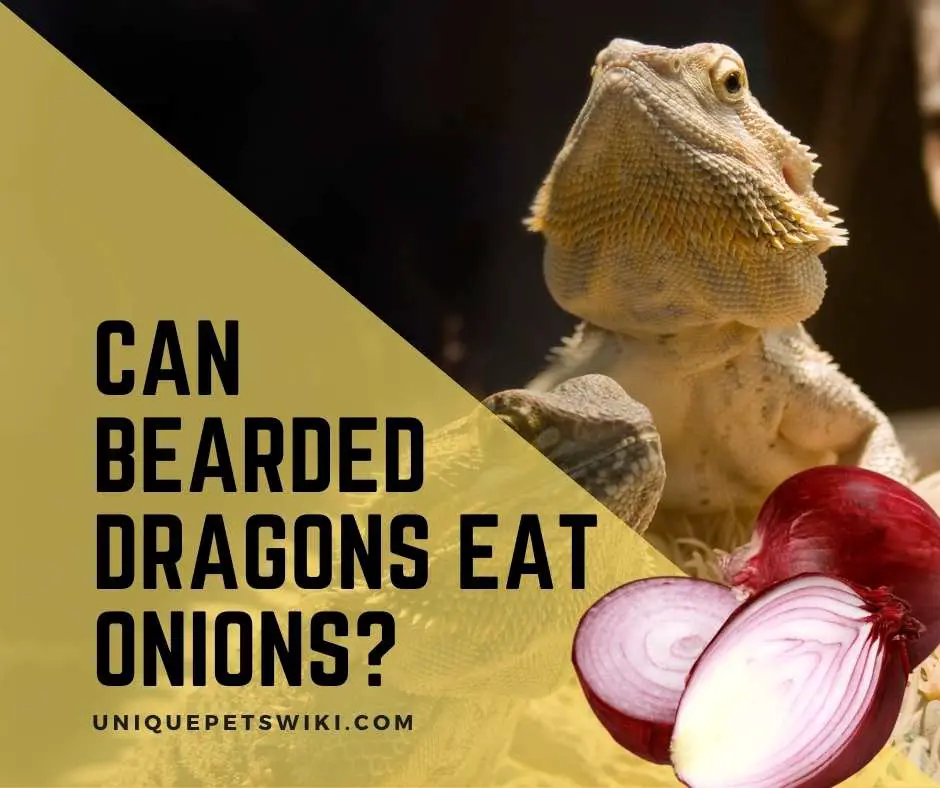When it comes to feeding bearded dragons, there are so many food options to choose from, and the owners are always overcurious about what their beardies can consume safely. What about onions, can bearded dragons eat onions and are they safe?
Sometimes your dragon may eat onions, and this brings a big concern if you don’t know what effects onions have in bearded dragons. Perhaps you will be worried that your lizard friend may get sick or probably die.
Well, bearded dragons should not be fed on onions as they are incredibly acidic. The beardie’s digestive system is pretty sensitive, and the high acidity in onions can lead to severe complications in the system.
In this article, we’ll go deeper into bearded dragon and onion details, and we’ll cover other related information.
This article has been reviewed by Dr. Dilber. Read more about our knowledge control process here.
Contents
What Are the Nutrients Found in Onions?
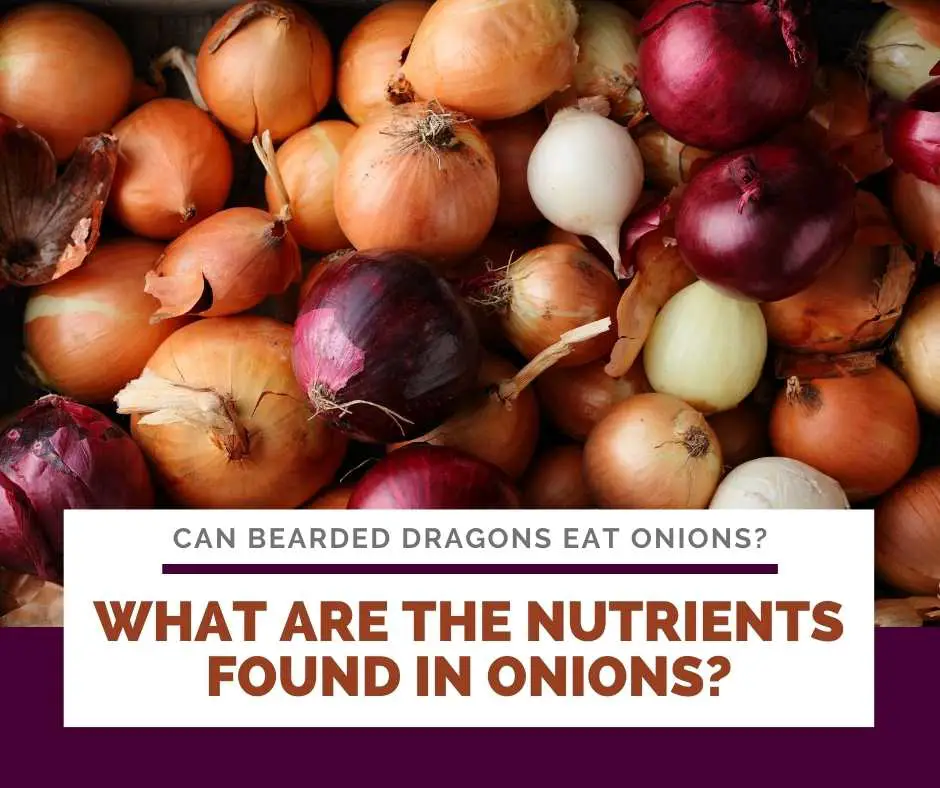
As far as the beardies are concerned, it is essential to consider the acidic, calcium to phosphorus ratio, protein, sugar, fiber, fat and water content in onions.
Understanding the nutritional profile of onions is essential, and we get to know if they have any nutritional value in bearded dragons.
Below are the nutrients contained in 100 grams of onions, according to the US. Department of Agriculture.
- Water: 89.11g
- Energy: 40kcal
- Total fat: 0.1g
- Sugars: 4.24g
- Dietary fiber: 1.7g
- Calcium: 23mg
- Phosphorus: 29mg
- Potassium: 146mg
- Sodium: 4mg
- Vitamin C (ascorbic acid): 7.4mg
- Niacin: 0.116mg
- Folate (folic acid): 19µg
- Pantothenic acid: 0.123mg
As you can see from the list (items in red), onions contain several acidic nutrients, and that is why it is too acidic. Onions are not harmful to humans, but they can be toxic to bearded dragons because of their delicate digestive system.
Another downside about onions is that the calcium to phosphorus ratio is disproportionate. As indicated in the list above, the proportion of calcium to phosphorus is 1:1.26, but the adequate balance should be 1:1 or 2:1.
Can Bearded Dragons Eat Onions?
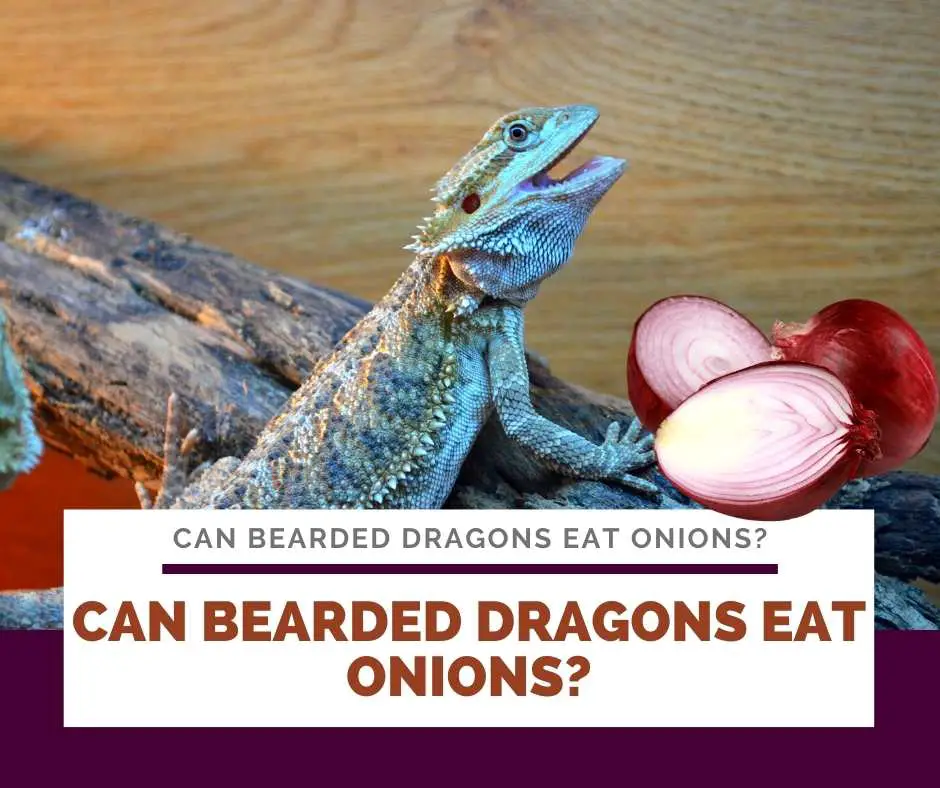
To reiterate, bearded dragons should not eat onions at any circumstance since they are pretty acidic and have a relatively low nutritional value. The beardies body cannot handle the acid content in onions, and this can result in unwanted health problems.
Even after knowing that onions are dangerous for bearded dragons, some pet owners tend to believe that cooked onions might be safe. But nothing will change after that, so, in whichever form, onions are forbidden vegetables for bearded lizards, and you should avoid them.
When preparing the beardies salad or you are buying packed food from the supermarket, ensure that no onion is contained in the food. For the packed meals, check the list of ingredients to make sure that it does not have onions.
Sometimes, your lizard friend may eat onions unintentionally, making you panic. A small bit of onion may not be harmful to the beardie, but it is always recommended to observe if there’ll be any behavioral changes in the lizard.
In case you see your pet behaving abnormally, make sure to visit your reptile vet for help.
Why you Should Never Feed Onions to Your Bearded Dragon
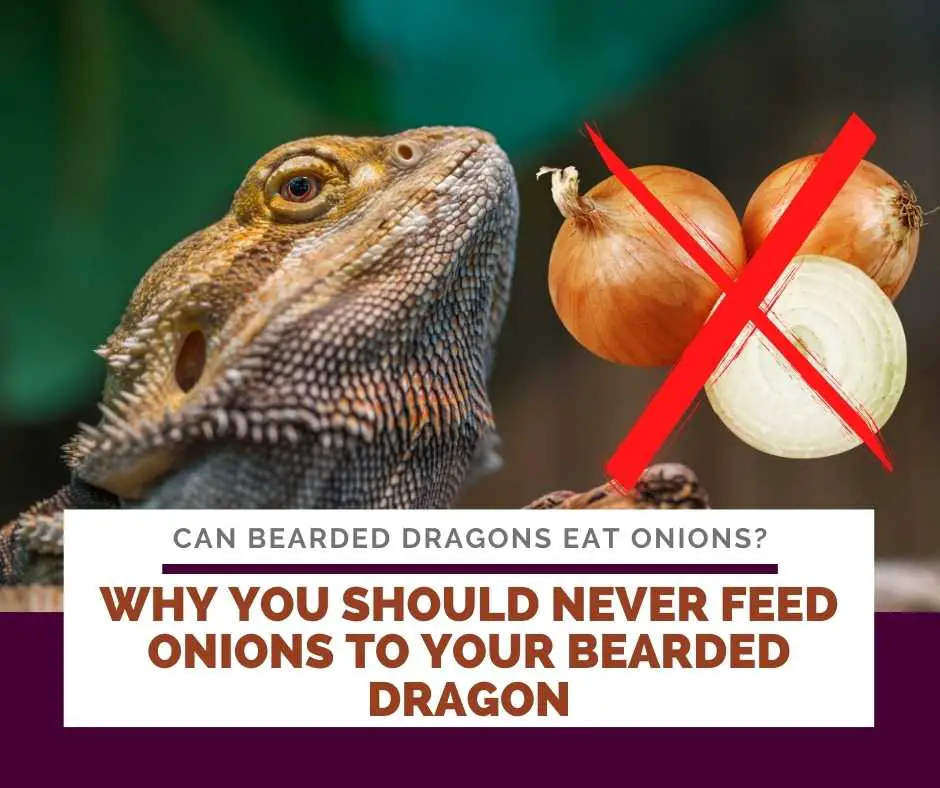
By now, you know that onions are among the foods that you need to avoid as far as bearded dragons are concerned. So, let’s discuss more in-depth details and understand why onions are typically poisonous to bearded dragons.
High Acidity Level
The high acidity level in onions tends to cause a burning sensation on the tongue and mouth, and the beardie becomes so irritated, and the chances are that it won’t eat food any more. Feeding onions can also result in heartburn and irritation on the throat.
The high acid content in onions interferes with the normal function of the digestive enzymes in the stomach by inactivating them. Eventually, there will be poor digestion and absorption of nutrients into the body.
The digestive enzymes of the bearded dragon cannot work efficiently in acidic PH. As a result, acidic foods can cause poor digestion.
Disproportionate Ca:P
The proportion of calcium to phosphorus in onions is unbalanced as we saw from the onion’s nutritional profile in the list above in the article.
Therefore, onions are not suitable vegetables for bearded dragons due to ion imbalance they cause in the body. Too much phosphorus interferes with calcium intake into the body, and this means that the beardie is not getting adequate calcium.
On the other hand, excess calcium is extremely toxic and can cause severe health issues. The best way is to provide a healthy diet with sufficient nutrients to ensure there is ion balance in the body.
The proper ratio between calcium and phosphorus for the beardies is 2:1 (two grams of Ca for every one gram of P) or 1:1.
When there is low calcium content in the bloodstream, the beardie extracts more of it from the bones. Eventually, the removal of Ca from the bones leads to health problems like a metabolic bone disease.
The toxification of the Digestive System
There are toxic substances contained in onions, and they are the reason for digestive issues in bearded dragons. For instance, if the beardie eats onions, they can lead to vomiting, burning sensation, and incomplete digestion.
Onions do produce invisible steam that makes us cry while slicing them, do you know that feeling? Bearded dragons will not cry as we do, but the steam also affects them, they might shed some tears.
When included as part of the diet, onion leaves release some slippery fluids that fall on the greens and vegetables, and this makes the meal unpleasant for the beardie. Onions pose many problems than benefits in bearded dragons, and that is why you need to avoid them at all cost.
Are there Other Vegetables that I Should Not Feed My Bearded Dragon?
Bearded dragons can eat a variety of vegetables, but not all veggies are suitable for them. It would be best if you always were pretty careful about what you feed your bearded dragon because some foods can be toxic.
Let’s look at the veggies that you should never give your dragon. Spinach, lettuce, rhubarb, broccoli, romaine and beet tops need to be avoided at all circumstances. Most of them don’t have nutritional benefits to bearded dragons.
For instance, spinach has a high calcium-binding ability, and this prevents calcium absorption into the body. Due to calcium deficiency, the dragon may suffer from the metabolic bone disease (MBD).
Rhubarb contains high oxalic acid content that is incredibly toxic as it leads to digestive issues in the beardies. Beet tops also inhibit calcium absorption in the body, similarly to spinach.
Lettuce is a favorite food to bearded dragons, but it has minimal nutritional value to them. They have a lot of water that can cause diarrhea in the beardies. These are only veggies but there are many fruits and insects you should also avoid feeding your lizard.
Wrapping Up
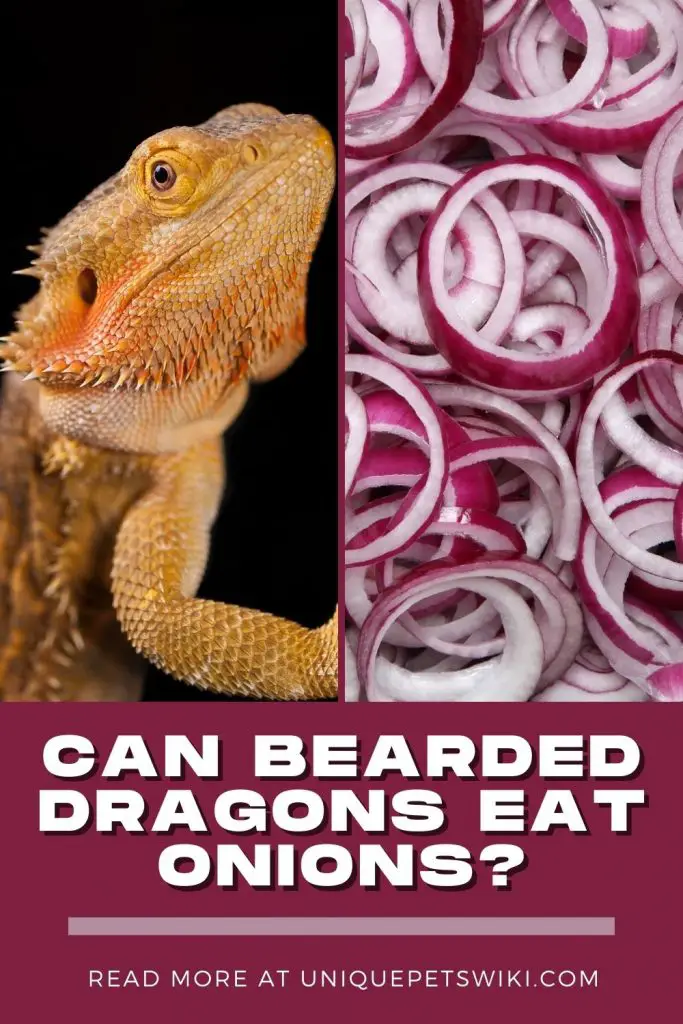
It is due to the high acidic nature, low calcium to phosphorus and toxic substances contained in onions that makes them unsuitable for bearded dragons. All species of onions, whether raw or cooked, should be avoided altogether.
Onions are not only toxic to bearded dragons, but they can also be harmful to household pets like dogs and cats. Now you know how dangerous onions can be to your lizard pet. So, please don’t use them at any time.
The most suitable veggies to feed bearded dragons are Acorn squash, Parsnip, Okra, Carrots, Asparagus, Broccoli, etc. I hope this article has been helpful to you.
